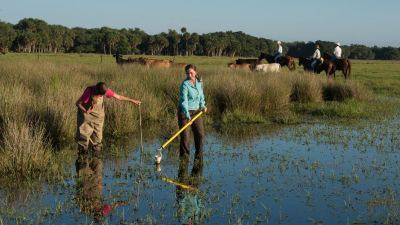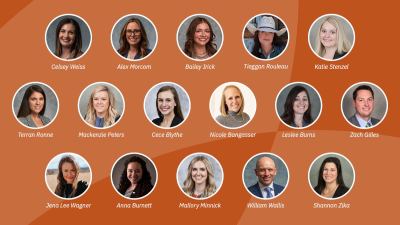Padraig Hennessy: Reducing labor through precise mineral delivery

Over and under-supplementation of animals can result in increased workload and loss of revenues for farmers.
With new technologies like artificial intelligence and machine learning expanding into all industries, agriculture has an opportunity to become more efficient. TERRA NutriTech, an Ireland-based startup, is using these technologies to eliminate waste and ensure accurate mineral delivery through water systems to boost farmer’s profits by reducing labor.
The following is an edited transcript of Kara Keeton’s interview with Padraig Hennessy. Click below to hear the full audio.
Kara: I'm here today with Padraig Hennessy, co-founder and CEO of TERRA NutriTECH, one of the Pearse Lyons Accelerators presenting at ONE19 (The Alltech Ideas Conference). In 2012, he founded TERRA NutriTECH with his brother, Tom. Tell me a little bit about TERRA NutriTECH and how it got its start.
Padraig: We have a sister business and we started out about 12 years ago. In that business, we designed and installed water systems on farms. Through that, a lot of customers kept coming to us, asking, "You guys are in water. Have you got a better way to put minerals and supplements into the water system?" Eventually, a handful of people asked us that we start looking around the world and looking for what systems are out there. We have three components that we have to have: it was precision, it needed to be automated and it needed to be easy.
We couldn't find any system out in the world that had all of those elements for us, so we coupled together some existing technology and we launched about five and a half years ago now up to this stage, and that's how we initially began — a very, very slow start, testing the market out to see, is there really a market here, and we literally, every year, kept doubling the size of the business. More and more customers are coming, on and on and on, and it was a fantastic start. That really got us going in the market. From that, then, we realized that the technology needed a big upgrade and we needed to bring it in to the 21st century, utilizing artificial intelligence, IoT — again, making the data easily readable for farmers. That was always key for us.
Kara: With the AI, how have you really brought that into the system and innovated it to help meet the farmers' needs?
Padraig: One of the key drawbacks with putting minerals into the water systems was variations in water consumption, so we've developed machine learning effectively in our system where we're constantly monitoring animal water intake, and an advanced algorithm that we've developed changes the concentration levels to ensure exact dosage each and every day per animal. That's the main component. We've got further iterations to come down along the track, where we can start becoming predictive of what the farmer will need via supplements, looking at water consumption, looking at weather, looking at animal life cycle. I'm helping them to become predictive rather than reactive.
Kara: How have the farmers adapted to this technology? Is it something that is easy for them to use, or have you seen the challenges with that?
Padraig: No. I grew up in a farm, and so I know exactly what farmers want, to be honest. My dad would've been a very traditional farmer. He actually would've started — when my dad first started farming, it would've been with a horse and plow, so I knew exactly what farmers needed. What farmers need is something that's robust and easily used; we always had that mindset when we were designing everything. Really, systems have to be hands-off, from the farmers' perspective. Systems just need to work. If they need to do something with it, it needs to be really, really easy, so we always develop it with that in mind. Many of our customers are completely hands-off with our system. They call us up if they need something or need to change something. With our new app, now, it's literally (you just have to) open it up. If five animals have left the herd, they can just decrease the herd number by five and ensure precision dosing continues.
Kara: So, it's all based on the app then.
Padraig: Yes, a controller on-farm with our technology. So, the way our technology works is water first goes through a water meter. It's connected to our computer controller, so we're constantly monitoring the water intake. Exact herd numbers and exact data requirements of minerals are inputted either on the controller or on our app, and both communicate to each other. Then, on any given day, we can dose in. Let's just say there are 434 animals and there are 10 grams of supplements needed for each. That's 4.34 kg, and that's exactly what we will put in on that day, so it's highly, highly accurate. If ten animals go off and there are only 433 tomorrow, then, tomorrow, we put in 4.33 kg, so it's always precision of what we do.
Kara: So, along with ease, how does this impact the farmers' bottom line? Because that is always a concern.
Padraig: That is the concern. You can make great technology, and there's loads of good high-tech coming out, but it's hard to see how it will impact the bottom line. With our system, (a) there's no waste, so you completely eliminate waste, and (b) with the accuracy, you're ensuring Cow Number 99 out of 100 will get the same concentration, the same level of supplements, as Cow Number One. Therefore, the uptake and the health of each and every animal is maximized, so there's better calving. There's better fertility. There's less lameness, overall, healthier animals. That is what will impact the bottom line. All would reduce labor.
Kara: How many farms, would you say, have introduced this technology into their operations to date?
Padraig: Currently, we are only operational in Ireland, and we're just about to launch internationally, so we have about 350 farms using this technology to date, and we're still growing very, very quickly. We have a customer retention rate of about 98% every year, so when somebody switches on our system, they stay on our system, because they just find it so easy and they're getting the results to back it up.
Kara: Now, you presented at the Pearse Lyons Accelerator. What was this experience like, and how did you come across this opportunity?
Padraig: I originally saw the opportunity about two years ago, when the accelerator was first launched, and it interested me then. We were still in the midst of developing our technology, so it was a bit early for us. So, when we applied this year, I obviously knew who Alltech was. I'm in the nutrition space, and I realized it could be a huge opportunity for us to introduce our technology to a much, much wider audience.
Really, participating in the accelerator has far exceeded my expectations. Actually, I was blown away by the resources and the time that all of the Alltech senior management put into it. Literally, I don't think they could've been more helpful to us. It's really been just an absolutely fantastic experience for us, and not only that, but interacting with the other participants on the accelerator as well opens up your mind to other technologies and potential collaborations down the road. None of us are in competition. We can all help each other in our paths, and that's a fantastic opportunity to have.
Kara: Speaking of your path, where do you see TERRA NutriTECH in the next five to ten years? How do you hope to grow the company?
Padraig: We're going to grow internationally. Currently, we're talking to nutrition companies in New Zealand, France, the U.K. and the USA about utilizing our technology in ruminants, in poultry, in swine. The system we've developed is the most accurate system on the market now. It's the only mineral-dispensing system that will allow supplement companies a viewpoint inside the farm gate. So, because of that and because of the data we're generating and the insights we're generating on-farm, we see huge opportunities, and we really do expect rapid expansion.
Kara: Are you using this data for other research with other companies or with scientists at this time?
Padraig: At this time, no, but we will shortly be going down (that path), because it's a way to prove the efficacy of a product. If a product is going in and you know there are a hundred farmers using it, then you can start to actually look at the data behind it. Are they improving milk? Are they improving yield? Are they improving health? So, we can actually start to get down deep into that data to ensure that the products that are released are what they're supposed to be.
Kara: Thank you so much for your time today. This is Padraig Hennessy, co-founder and CEO of TERRA NutriTECH.
Padraig: Thank you very much.















